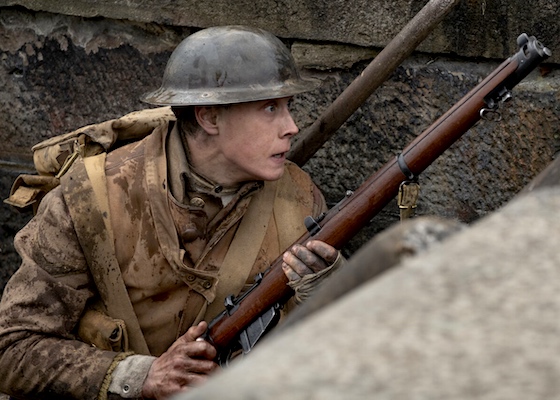A busy weekend means this post is later than normal. As for the title, yeah, I saw Parasite. (I highlight that just so you don’t go expecting any actual metaphors later in this post.)
Also, as I write this I’ve realised Parasite is the first Best Picture winner I’ve actually seen at the cinema since, of all things, Crash. And the only other one is The Lord of the Rings: The Return of the King. What an elite club to be a member of…
#14 The Nightingale (2018)
#15 Johnny English Strikes Again (2018)
#16 Tag (2018)
#17 Shoplifters (2018), aka Manbiki kazoku
#18 A Star Is Born (2018)
#19 Blockers (2018)
#20 Emma. (2020)
#21 Yesterday (2019)
#21a The Crimson Permanent Assurance (1983)
#22 Monty Python’s The Meaning of Life (1983)
#23 Us (2019)
#24 Escape Room (2019)
#25 The Equalizer 2 (2018)
#26 All Quiet on the Western Front (1930)
#27 Mary Poppins Returns (2018)
#28 Parasite (2019), aka Gisaengchung
#29 Terminator: Dark Fate (2019)
#30 Mamma Mia! Here We Go Again (2018)



- So, I watched 18 new feature films in February.
- That makes it the best month of 2020 so far. Okay, it only had one to beat, so, looking further afield, it’s the best month since last August.
- It also surpasses February’s average (previously 12.83, now 13.2) and the rolling average of the last 12 months (previously 12.75, now… 12.75, because I also watched 18 films last February. Fancy that).
- Passing #25 means I’ve passed the quarter-way point already. But the last time I didn’t get there in February was 2014 (when it took until April), so it’s not that noteworthy an achievement. Especially as, since last year, I’m meant to be aiming for 120+ films in year.
- But, good news, I’ve reached the quarter-way mark for 120, too! Ending February at #30 means so far I’m behind 2016 and 2018, but marginally ahead of 2015, 2017, and 2019.
- Lots of 2018 films this month — to be precise, nine of them, or 50% of my viewing. That’s because I’m making use of my annual month of Now TV / Sky Cinema to catch up on some misses, and as they get a lot of recent stuff first, currently that means it’s mainly 2018 misses with a smattering from 2019 (overall, 61% of this month’s viewing was via Now TV).
- Monty Python aficionados may have observed that I’ve chosen to list The Crimson Permanent Assurance separately from The Meaning of Life. It’s commonly presented as part of the film these days, but even then it’s still separated from the main feature. It was independently nominated for a BAFTA back in the day, too, so it sort of is part of the film and sort of isn’t. And anyway, while we can argue whether it counts as a standalone work or not, the fact it’s a short means I don’t give it a full number, so even if you do disapprove of listing it separately, at least it doesn’t affect my count for the year.
- This month’s Blindspot film: anti-war WW1 classic, and early Best Picture Oscar winner (so an apt choice for this month), All Quiet on the Western Front.
- As best I can tell, All Quiet on the Western Front is the only film I’ve ever seen from 1930. That’s noteworthy because the only other year since talkies came along for which this is true is 1932. Quite how I’ve ‘missed’ those two years, who knows. (If we go back into the silent era, there’s still only a few more years I’ve missed; but, as we’re talking about years with feature films, it gets a little more complicated for that period.)
- From last month’s “failures” I watched Booksmart, The Nightingale, and Yesterday.

The 57th Monthly Arbitrary Awards
 Favourite Film of the Month
Favourite Film of the Month
This month’s viewing includes the most recent winner of the Palme d’Or, the first-ever non-English-language film to win the Oscar for Best Picture, and the movie Letterboxd users have rated the #1 of all time… all of which epithets describe the same film, of course: Bong Joon Ho’s Parasite. It’s an awful lot of pressure to put on a film the first time you watch it. I thought it was great, but how great I’m not sure. So a clearer pick here is All Quiet on the Western Front, another Best Picture winner that has stood the test of time — 90 years and counting.
Least Favourite Film of the Month
In contrast to such greatness, there was plenty of choice for the weakest movie this month. On balance, I think the dishonour belongs to Mamma Mia! Here We Go Again — even by the lowly standards set by the first movie, this follow-up is a mess.
Big Name Star Popping In Near the End of a Crummy Musical for a Couple of Minutes to Sing Part of a Song or Two …of the Month
By coincidence and the vagaries of fate, I saw Meryl Streep do this twice this month. Both were in films released in 2018, so this recognition only comes 14 months late.
Best Musical Number of the Month
They may’ve lavished A Star Is Born and Mary Poppins Returns and Mamma Mia 2 with money and star power and all the tricks of modern moviemaking, but the best song-and-dance number I saw this month remains Monty Python’s Every Sperm is Sacred.
The Audience Award for Most-Viewed New Post of the Month
No doubt bolstered by its BAFTA wins and predicted (but unmaterialising) Oscar glory, this month’s top new post was 1917.
With an end goal of 50 in mind, my Rewatchathon stays on course this month…
#6 Sherlock Holmes and the Voice of Terror (1942)
#7 Christopher Robin (2018)
#8 The Karate Kid (1984)
I still quite like Christopher Robin. Yeah, it’s just the plot of Mary Poppins remade with Winnie the Pooh, but I like Pooh bear a lot so that doesn’t bother me too much.
Some thoughts on The Karate Kid on Letterboxd, and I intend to do a ‘Guide To’ post for it some day — mainly because I enjoyed it enough that I’m intending to watch the sequels, which I’m not sure I’ve ever seen, so I’ll number and review them as new films.
Normally I start this section with all the films I missed on the big screen, but the big news nowadays is surely Netflix’s rollout of Studio Ghibli’s back catalogue (seven last month, seven today, the final seven on April 1st). The ones I hadn’t already seen, and still haven’t, from their February lot are Kiki’s Delivery Service (which I own on Blu-ray anyway), Ocean Waves, Only Yesterday, Porco Rosso, and Tales from Earthsea. Also new to Netflix and on my radar last month were Lady Bird, Hostiles, Proud Mary, and Year One (which I only notice because it was on my ‘50 unseen’ in 2009). One of their originals caught my eye, too: The Coldest Game. Sounded like a genre that’s up my street, but that’s literally all I know about it. Considering the variable quality of Netflix originals, the fact no one seems to be talking about it probably doesn’t bode well.
Over on Amazon Prime, higher profile additions this month include Emma Thompson comedy Late Night and Luc Besson actioner Anna. Also drawing my attention was Joe Wright’s Anna Karenina, returning to the streamer after five years away (that’s another from an old ‘50 unseen’ list); Super Size Me 2, the much-less-talked about sequel to the much-talked-about documentary; Anthony Hopkins / Ryan Gosling thriller Fracture (a film I was just about aware existed but had ignored; but, in the sea of mediocrity that’s added to Amazon, that recognition was enough to make me read the blurb and note the decent score it holds on IMDb); and Spy Game, which I’ve seen (it’s in my 100 Favourites, even), but only own on DVD, so here’s my chance to rewatch it in HD.
And, as I mentioned, I’ve currently got Now TV for a little bit yet, so some of the stuff I’d particularly like to catch on there includes Burning, The Kid Who Would Be King, The Wedding Guest, Can You Ever Forgive Me?, Crazy Rich Asians, and Mary Queen of Scots. Plus, all the Karate Kid sequels. And, drawing my attention away from that limited-time offering to something else I’ve paid for, I’ve got rentals of Hustlers and Fast & Furious: Hobbs & Shaw that expire in March (both of those were on my most recent ‘50 unseen’, incidentally).
Away from the internet, I got a bit carried away with Blu-ray purchases this month — there are 16 I could list here. Top of the pops is Joker. Also, Criterion’s release of Roma, which I got more for the special features than the film itself (because I can watch the latter on Netflix in UHD). Also on the rewatch list were Gods of Egypt in 3D (like I said would happen); one of my favourites from last year, Searching, which I got new for just a couple of quid; and Phantom Thread, which I also mentioned last month when it came to Netflix, but I finally got on UHD disc (in a two-for-one with Angel Heart). But the biggest single chunk belongs to 88 Films release of Jackie Chan titles, of which I picked up six this month, including four in a sale (Battle Creek Brawl, Dragon Fist, Snake & Crane Arts of Shaolin, and To Kill with Intrigue) and two newer releases (Crime Story and The Protector).
Finally, ending where I normally begin, the stuff I missed on the big screen. I nearly went to see Birds of Prey, but I’ll surely buy it for my disc collection eventually so I decided to save the money and wait. I’ve already pre-ordered The Lighthouse, which didn’t come to my local at all. I was never likely to bother with Dolittle or Sonic the Hedgehog, though I’m sure I’ll catch them on streaming sometime. I’m less sure about The Call of the Wild, thanks to that terrible looking CG dog. I’m all for using effects for stunts and stuff, but when it’s also in regular scenes interacting with humans, it just looks fake. Finally, The Invisible Man just came out to strong reviews. I don’t normally bother with horror on the big screen (I prefer to get scared in the secrecy of my own home, thanks), but I’m tempted to make an exception.
More ticking off misses from 2018/19 courtesy of Sky Cinema. Cinema trips seem unlikely (maybe for Mulan), with my attention on the month after and the return of Britain’s best-known secret agent.













 British Academy Film Awards 2020
British Academy Film Awards 2020


